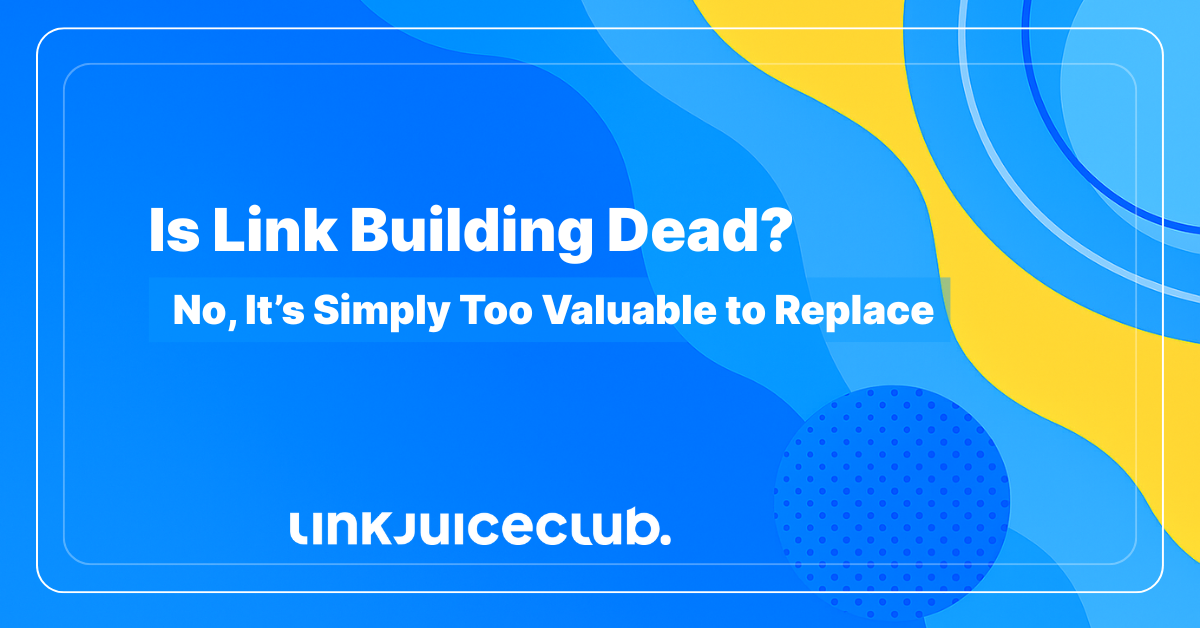
Is Link Building Dead? No, It’s Simply Too Valuable to Replace
Every year like clockwork, someone declares link building dead.
A tweet, a blog post, a LinkedIn rant, it’s always the same noise: ‘’Google has finally neutralized links!’’ And yet, here we are… again.
We’ve been deep in the SEO world for nearly years now, and we genuinely can’t remember a single year where this myth didn’t resurface. The narrative usually rides on the back of a new core update or another vague announcement from Google’s team.
And sure, Google loves to play the part. Their engineers make strong claims. Their blog posts hint at penalties. Their spokespeople warn of ‘’unnatural link patterns’’. Basically, every year brings the same narrative: there will be no more link building, and those who engage in it will be ‘’punished’’.
But fast-forward to today? The link economy is not just alive, it’s booming! We’re talking about a billion-dollar ecosystem that keeps growing, fueled by a search engine that still leans hard on authority signals to rank pages.
So, is link building dead then? Spoiler: the ‘’link apocalypse’’ never came. And it never will!
Google vs. Link Building: The Never-Ending Bluff
For over a decade, Google has been issuing bold warnings about link building, shouting from the rooftops that backlinks don’t matter like they used to, that unnatural links get ignored, and that paying for placements is a one-way ticket to penalties.
And yet… the results speak for themselves.
Despite all the public posturing, backlinks remain one of the strongest ranking signals in the algorithm.
If you’ve ever run real-world SEO experiments or tried to move the needle in a competitive niche, you already know: link building isn’t in decline. It’s in demand!
Why all the noise from Google? Simple. They want control. The more they convince SEOs that links are worthless, the less they have to worry about people bypassing their filters and leveling the playing field.
If everyone actually stopped building links, it would hand Google the power to crown winners in the SERPs based on internal criteria (rather than the open-market influence of link equity).
Their message isn’t about fairness. It’s about control.
Backlinks: The Internet’s Original Trust Signal
Google was built on backlinks. Literally.
From the beginning, the PageRank algorithm turned links into a digital trust signal, measuring which pages deserved visibility. Fast forward to now, and despite all the updates, hand-waving, and scare tactics, links still drive results.
Here’s the reality behind the curtain:
1. Local businesses can’t survive without directory listings, citations, and neighborhood-specific backlinks.
2. Affiliates rely on strategic guest posts, niche placements, and entire link networks to stay on top of the money pages.
3. And the sites with the strongest link profiles? Still ranking. Still winning.
If backlinks were truly irrelevant, we wouldn’t see thousands of high-performing domains stockpiling them like gold. We wouldn’t see negative SEO campaigns using toxic links to sabotage competitors. And we wouldn’t need sources in AI tools like ChatGPT to validate authority.
Backlinks are the currency of trust on the web.
And until that changes, they’ll remain the backbone of search, no matter what PR spin Google puts out next.
The Link Economy Is Bigger Than Google Wants to Admit
If link building were truly obsolete, the SEO industry wouldn’t be pumping billions into it every single year.
From agencies and outreach services to brokers and link marketplaces, there’s a thriving ecosystem built entirely around the value of backlinks. Whole businesses exist solely to build, manage, or analyze links.
Even powerhouse SaaS tools like Semrush and Ahrefs are deeply rooted in backlink data because, let’s face it, links still steer the search game.
Behind the scenes:
💣 Global brands secure premium placements on high-authority sites regularly.
💣 SEOs continue to pour money into private link networks that drive results.
Bottom line? If backlinks didn’t move rankings, this economy wouldn’t exist.
Google can downplay their importance all it wants, but the market knows better.
Who Actually Needs Link Building? (Another Spoiler: Most Sites Do)
If you’re aiming to rank in a competitive space, building links is, as you could see, non-negotiable. Let’s break it down by site type:
🧲 Affiliate Sites
In the affiliate world, content alone doesn’t cut it. Without strong links, even stellar pages get buried.
🛒 E-commerce Stores
Big online retailers aren’t just running ads. They’re building links at scale: every product page that ranks is backed by authority-driven linking strategies and sharp internal link architecture. That’s how they stay visible and dominant.
🏙️ Local Businesses
Try getting a local plumbing service to rank in a major city without directory listings or regionally relevant backlinks. You’ll lose out to older domains with stronger authority, even if your website is better.
📰 Content Sites & Blogs
Running a blog or niche content site? Then link building isn’t optional, it’s survival. Without consistent authority growth, you’ll struggle to gain traction or recover from even minor traffic drops.
💻 SaaS & Startups
From Top 10 comparison articles to PR-driven mentions, successful SaaS brands invest heavily in link building. It’s the only way to keep pace in this crowded space.
So, if you’re looking for high-impact backlinks that actually move rankings, you’re in the right place! Link Juice Club has spent years perfecting a system that delivers authority at scale, with real results to back it up.
When Link Building Isn’t Worth the Effort
Not every website needs to chase backlinks. So, in some cases, it’s a complete waste of time and budget.
Sites That Don’t Depend on Google
If search engine traffic isn’t a priority, there’s no reason to invest in a link strategy. These are businesses that get customers through other channels:
- Brands that thrive on TikTok, Instagram, or other social-first ecosystems
- Private communities that grow through referrals and word of mouth
- Mobile apps or SaaS products that rely on direct installs and paid acquisition
Sites Without a Foundation
Authority means nothing if your site is fundamentally broken.
Also, if your site has no internal linking, or your content reads like it was generated by a toaster, links won’t rescue you, no matter how much you invest in them (this is the truth that some cannot handle, but it is what it is).
The same goes for brand-new domains with no history or structure (unless you’re using aged domains or applying advanced tactics like parasite SEO).
Trying to rank with a broken site is like putting rocket fuel into a shopping cart. You need solid tech, quality content, and strategic intent before you even think about investing in links!
Bottom Line: Link Building Isn’t Dead!
Let’s cut through the noise once and for all: is link building dead? Not even close. It’s just no longer about spraying low-quality links and hoping for the best. The game has changed, and the best SEOs (like us!) have evolved with it.
What’s working now?
1. Strategic guest posts that offer value, not spam
2. Well-placed niche edits that pass authority without noise
3. Media coverage, sponsorships, and brand-driven link strategies that search engines respect
If you’re still clinging to outdated tactics like forum signatures or automated blog comment blasts, then yeah, for you, link building is dead. But for those playing at the top of their game? It’s alive, thriving, and shaping the future of digital visibility.
And let’s not forget: as AI systems, LLMs, and search platforms continue relying on linked authority to verify trust, those with strong backlink profiles will shape the narrative – and define what ranks, what’s referenced, and what’s remembered.
Welcome to a new era!
Link building didn’t die. It just outgrew the amateurs!





